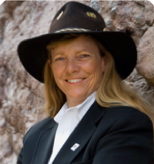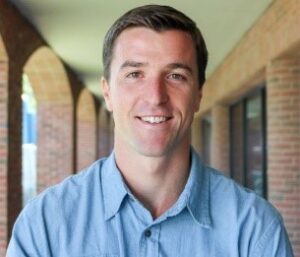This post was written by Henry Vogt ’19
“Hunter is disruptive” is the phrase we first saw as we walked into our second guest lecturer of the semester.
 Earlier this Fall we had the pleasure of hosting guest speaker Hunter Lovins. Suffice it to say, she knocked our socks off. I had heard Hunter’s name before, but wasn’t very familiar with her work or legacy. It became apparent right away that we were in for a unique and inspiring experience.
Earlier this Fall we had the pleasure of hosting guest speaker Hunter Lovins. Suffice it to say, she knocked our socks off. I had heard Hunter’s name before, but wasn’t very familiar with her work or legacy. It became apparent right away that we were in for a unique and inspiring experience.
Hunter’s body of work in sustainability and climate justice is prolific: from starting numerous influential non-profits, creating successful sustainable MBA programs from scratch, authoring best selling books, founding impact investing firms, and consulting with some of the largest corporations in the world including Unilever and Walmart, Hunter’s influence is extensive. This is augmented by her down-to-earth, Colorado ranch-style demeanor. She tells it like it is, passionately, in an inspirational way. She’s the type of person that understands that solving world problems is best facilitated over a whiskey, face-to-face. Hunter also owns a beautiful ranch in Colorado, where she easily could spend all of her time but instead chooses to be on the move, committed to her mission.
I asked Hunter how she envisions American capitalism evolving and whether she believes it has the capacity to solve the massive challenges facing our planet under current frameworks. She answered by giving a prediction from economist Tony Sebens: “Within 10 years, economics will dictate that the world will be 100 percent renewable. For this to happen, the world’s economy will be disrupted. This will be the ‘Mother of all disruptions.’ In other words, to save the climate we have to crash the global economy.”
If this is, in fact, the case, then the next decade will be tumultuous to say the least. This led our class session to focus on the question of what’s next and how do we collectively begin to prepare for this disruption. While this notion and idea can admittedly be not very uplifting, it was encouraging to hear suggestions from many of my classmates on how we may leverage our global economy and invest in Base of the Pyramid projects to find solutions and begin to strategize on how we may “soften the landing” from major global disruption.
Overall, having Hunter present to us was inspiring and eye-opening. While there are massive challenges ahead, having individuals like Hunter who are disruptive, driven, and committed to finding solutions to these challenges provides hope for the future.

 I wanted to continue working in a field that made a positive impact in our communities and on the world in general and felt the the private sector was the right place to move into, but I wanted — and needed — to expand my professional toolkit first.
I wanted to continue working in a field that made a positive impact in our communities and on the world in general and felt the the private sector was the right place to move into, but I wanted — and needed — to expand my professional toolkit first. Many of UVM’s 13 colleges and schools are at the forefront in their respective fields of research. In 2016, UVM received
Many of UVM’s 13 colleges and schools are at the forefront in their respective fields of research. In 2016, UVM received  I chose this program for its welcoming, collaborative environment and because I wanted learn the questions to ask and tools to use to make business better. I also love knowing that I will be back out in the world in less than a year, better equipped to make a difference!
I chose this program for its welcoming, collaborative environment and because I wanted learn the questions to ask and tools to use to make business better. I also love knowing that I will be back out in the world in less than a year, better equipped to make a difference! Despite these amazing numbers, almost everyone has experienced a time when our brain seems small; incapable of remembering simple things, and incapable of performing simple tasks. This happens to almost everyone, including the brilliant minds of UVM’s Sustainable Innovation MBA students.
Despite these amazing numbers, almost everyone has experienced a time when our brain seems small; incapable of remembering simple things, and incapable of performing simple tasks. This happens to almost everyone, including the brilliant minds of UVM’s Sustainable Innovation MBA students.

 The first way that business can help refugees is by investing in refugee-owned/founded businesses. Research shows that refugees are more likely to hire fellow refugees. Because of this investment, businesses can support more than just one refugee; they can help many others get hired as well. One example of an impact investment organization that specializes in investing in refugee-founded businesses is the Refugee Investment Network (RIN). The RIN works to help move private capital to investment in financing of companies that benefit both refugees and their host communities.
The first way that business can help refugees is by investing in refugee-owned/founded businesses. Research shows that refugees are more likely to hire fellow refugees. Because of this investment, businesses can support more than just one refugee; they can help many others get hired as well. One example of an impact investment organization that specializes in investing in refugee-founded businesses is the Refugee Investment Network (RIN). The RIN works to help move private capital to investment in financing of companies that benefit both refugees and their host communities. While most incoming Sustainable Innovation MBA students were worried about academics or moving to a new city, my biggest concern was whether or not I would have the time for bike races. Maybe my priorities weren’t totally in order, but the drive to ensure that I made time to train and race my bike brought me some success in the program. On the first day of orientation, I had convinced myself I would be too busy to race, and that my focus needed to be on nothing but school. Being a bike racer though, I can be competitive at times, and decided that I would compete with myself to race as many times as I could between August and December. The thing standing in my way was fourteen courses. My only option was to create productivity strategies that forced me to stay far in advance of deadlines and deliverables.
While most incoming Sustainable Innovation MBA students were worried about academics or moving to a new city, my biggest concern was whether or not I would have the time for bike races. Maybe my priorities weren’t totally in order, but the drive to ensure that I made time to train and race my bike brought me some success in the program. On the first day of orientation, I had convinced myself I would be too busy to race, and that my focus needed to be on nothing but school. Being a bike racer though, I can be competitive at times, and decided that I would compete with myself to race as many times as I could between August and December. The thing standing in my way was fourteen courses. My only option was to create productivity strategies that forced me to stay far in advance of deadlines and deliverables.